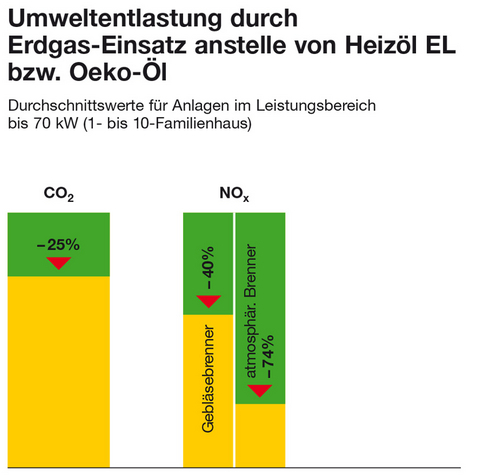Main Content
Natural gas – the environmentally friendly energy

One of the biggest environmental problems in Switzerland is air pollution. Air pollutants not only damage health and the environment where they are emitted, but also dozens or even thousands of kilometres away.
In Switzerland, the Swiss Federal Office for the Environment, Forestry and Countryside (BAFU) monitors environmental development and adverse effects on the environment, enacts laws and regulations, and also enforces them.
Natural gas makes a positive contribution to conserving the environment thanks to its simple chemical structure and low emissions.
Particulates – natural gas produces five times fewer particulates than heating oil and 100 times fewer than wood
Particulates alerts are issued on a regular basis due to heavy traffic, heating systems and high fog layers. Particulates cause breathing difficulties or even serious lung diseases for many people. Natural gas vehicles are a quick, readily effective measure to combat particulates in road traffic and reduce CO2 emissions. Unlike petrol and diesel vehicles, they produce virtually no soot or other particulates.
A study by the Swiss Federal Office for the Environment (BAFU, formerly BUWAL) also clearly reveals that using natural gas for heating can reduce environmental pollution by half. Natural gas offers decisive advantages over wood with regard to particulates thanks to soot-free combustion.
Particulate pollution levels at:
- Bundesamt für Umwelt BAFU - Grafik Luftbelastung
- Ozon-Info - CH-Karte
CO2
Of all fossil fuels, natural gas contains the least carbon (C) and the largest proportion of hydrogen (H). If we take the same energy content, 25 per cent less carbon dioxide (CO2) is released during natural gas combustion than heating oil combustion.
As we all know today, CO2 has a considerable impact on the warming of the Earth’s atmosphere. Using natural gas instead of other fossil fuels helps to minimise the impact of CO2 on the atmosphere, thus also helping to mitigate the greenhouse effect. This also applies if the low methane losses from natural gas pipelines are taken into account. In Switzerland, these losses account for a few tenths of a per cent of countrywide natural gas distribution. If we add up all emissions from greenhouse gases throughout the entire natural gas and heating oil supply chain and then convert them to determine their greenhouse effect, natural gas performs about 25 per cent better than heating oil. The balance is even better for new pipelines and high-pressure pipelines.
Replacing oil heating systems with natural gas ones has made the greatest contribution to reducing CO2 emissions in Switzerland for years.


